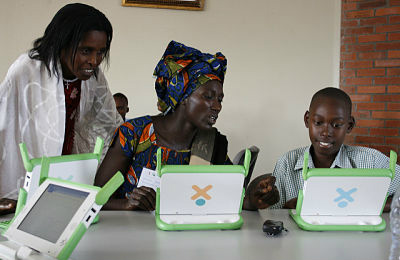Job-Training Programs in Rwanda Help Thousands
 New job-training programs in Rwanda are helping unemployed youth gain practical skills that allow them to find meaningful work. The Educational Development Center (EDC), a nonprofit founded by MIT researchers, recently announced its newest project, called “Huguka Dukore.” The five-year program offers job-skills training, provides internship opportunities and helps with job placement to 40,000 Rwandan youth.
New job-training programs in Rwanda are helping unemployed youth gain practical skills that allow them to find meaningful work. The Educational Development Center (EDC), a nonprofit founded by MIT researchers, recently announced its newest project, called “Huguka Dukore.” The five-year program offers job-skills training, provides internship opportunities and helps with job placement to 40,000 Rwandan youth.
For these young men and women, having skills that give them access to the job market is essential. In Rwanda, men and women under the age of 30 make up 60 percent of the country’s population. Many of them live on less than $1.75 a day, and the vast majority of them will never attend college. Additionally, those who go to work right out of high school find the job search extremely difficult.
USAID gave $20.5 million in funding for Huguka Dukore, which means “Get trained, let’s work” in Rwanda’s most widely-spoken language, Kinyarwanda. More than 200 government and business leaders support the initiative, hoping these new jobs will contribute to Rwanda’s growing economy.
Huguka Dukore follows on the heels of another EDC project in Rwanda, the Akazi Kanoze Youth Livelihoods Project, which has trained 21,000 Rwandan youth since its launch in 2009. Graduates became entrepreneurs, worked as certified caregivers for children or worked for a Rwandan company. Consequently, over half found employment within six months of completing their training.
Not all job-training programs in Rwanda are strictly technical; some have a creative side. For example, the nonprofit Indego Africa runs a vocational training program that teaches Rwandan women artisanal work. Started in February of 2016, the program is split into two main focuses: artisanal training and business instruction.
For three days a week over the course of six months, the class of 45 women learns sweetgrass basket weaving, banana-leaf weaving, beading and sewing. They craft hats, bags, baskets and stuffed animals designed by a team in New York City and sell them online. On the other two days, the women go to Kigali, the capital, to learn computer skills, bookkeeping and budgeting. Consequently, taining young women allows the artisan collectives to continue to grow, even as the founding members age.
This new focus on job-training programs in Rwanda is part of Rwanda’s Vision 2020, as outlined by the UNDP. The country aims to shift dependence away from farming, a traditionally low-income lifestyle. They plan on creating 2.2 million jobs in industry and services. Consequently, Rwanda is making sure that its youngest population of adults receives preparation to work in the business sector.
– Emilia Otte
Photo: Flickr
